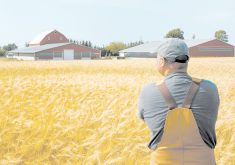According to Statistics Canada data, household food insecurity in the 10 provinces has reached a record high. Drawing on data from StatsCan’s Canadian Income Survey, our new report has found that the percentage of households with inadequate or insecure access to food because of financial constraints rose to 17.8 percent in 2022 from 15.9 percent in 2021.
That amounts to 6.9 million Canadians — 1.1 million more than in 2021 — living in households with experiences that range from worrying about running out of food before there’s enough money to buy more, to not eating at all for entire days because of a lack of income.
Read Also

Kochia has become a significant problem for Prairie farmers
As you travel through southern Saskatchewan and Alberta, particularly in areas challenged by dry growing conditions, the magnitude of the kochia problem is easy to see.
One-quarter of food-insecure households were severely food insecure, meaning 1.5 million Canadians had to cut or skip meals over the past 12 months.
These estimates don’t include people living in First Nations or the Northwest Territories, Yukon and Nunavut, where rates of food insecurity are typically higher.
Living in these circumstances is harmful to people’s health and well-being. The health implications extend beyond poor nutrition and diet-related diseases to a sweeping array of adverse health outcomes, including physical and mental health conditions and premature death.
Reducing food insecurity requires concerted efforts by federal and provincial governments to address the root cause — the inadequacy of household incomes to meet basic needs.
Providing better income support gives households a fighting chance of managing sudden losses of income or increases in expenses without having to compromise necessities.
Studies have shown food insecurity decreases when low-income households receive more money via child benefits or social assistance programs. However, these programs are poorly designed.
Households with limited or no employment income and reliant on provincial social assistance or Employment Insurance are likely to be food insecure. Relying on social assistance almost guarantees food insecurity; seven in 10 households on social assistance were food insecure in 2022.
Households reliant on employment income fare better, but simply having a job isn’t enough to prevent food insecurity. In fact, the main source of income for 60 percent of food-insecure households in the 10 provinces is salaries and wages.
This shows a need to expand job opportunities and improve the quality and stability of employment through policies like higher employment standards, support for collective bargaining and increased minimum wage.
The Canada Child Benefit has been credited for reducing child poverty, but this benefit goes to 90 percent of families in Canada. In stretching itself so thin, the benefit isn’t providing enough support to the families that really need it.
The Canada Child Benefit needs to be restructured to insulate lower-income families from food insecurity more effectively.
Governments have failed to implement changes to income policies informed by research on food insecurity.
The noteworthy exception is the newly announced Poverty Reduction Plan in Newfoundland and Labrador. The existing research suggests that it will help reduce food insecurity in that province.
The persistence of food insecurity in Canada is a policy choice. By not doing more to improve the adequacy and stability of household resources, our governments are choosing to let food insecurity fester.
In doing so, they are allowing the health of millions of Canadians to be eroded as we unnecessarily tax our already over-burdened health-care system.
Valerie Tarasuk is a professor of nutritional sciences at the University of Toronto. This article first appeared on The Conversation. It has been edited for length.

















